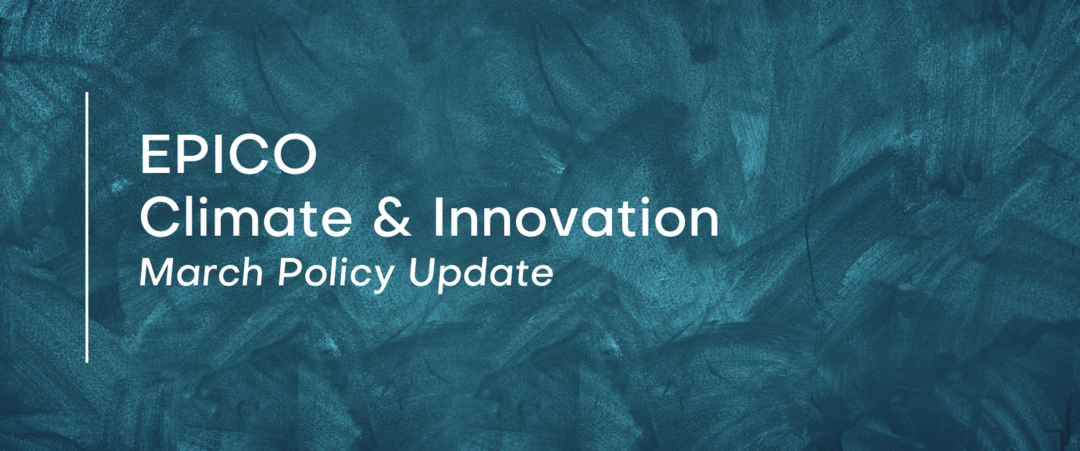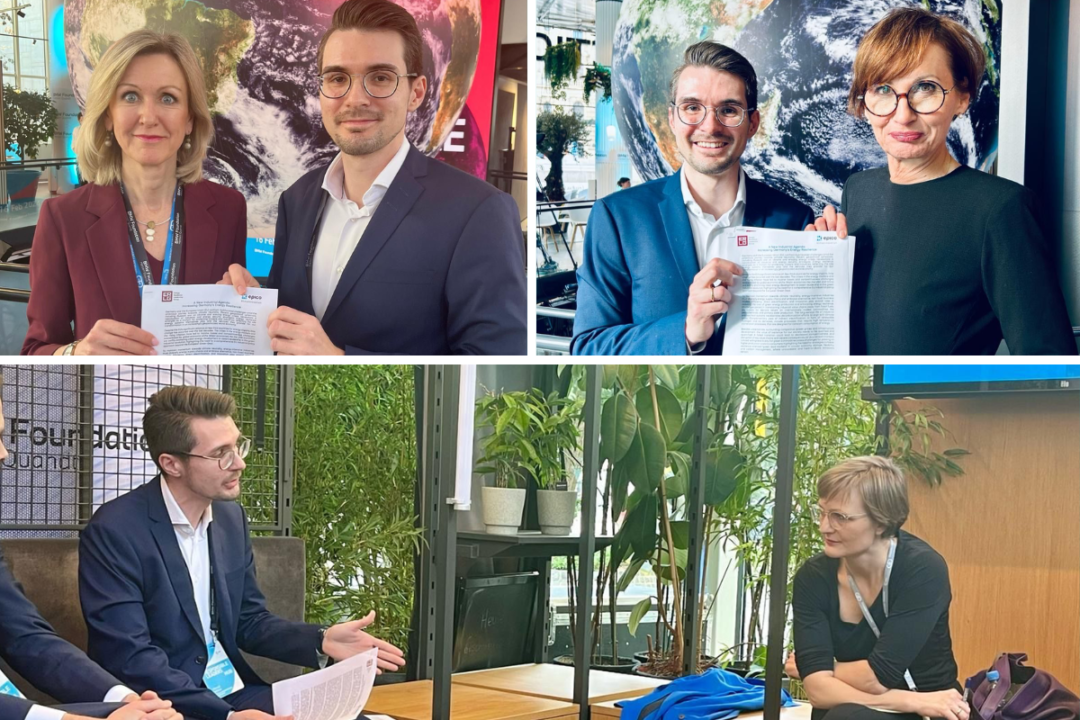
A new strategy for Europe: 2040 targets, industrial innovation, cleantech collaboration
EPICO KlimaInnovation is a non-profit and independent energy and climate policy think tank providing a platform and network for policy development. In our Monthly Policy Update, we dive into the latest and most relevant developments in energy and climate policy and share the outcomes of our events and publications.
Reaching the EU’s new climate target
On 6 February 2024, the European Commission unveiled the EU’s new2040 Climate Target - a requirement of the European Climate Law - calling for a 90% reduction in greenhouse gas (GHG) emissions. Commission officials based this target on an impact assessment and a report by the European Scientific Advisory Board on Climate Change (ESABCC).
EPICO welcomes this ambitious goal, but it must be followed by an effective policy agenda. Reacting to the Commission’s recommendation, we published a blog post, titled “Moving towards the 2040 climate target”, outlining 5 policy trajectories the EU must embark on to achieve this target:
- Rethinking Europe’s understanding of energy security;
- Designing a new industrial policy framework for innovation;
- Facilitating the “renewables pull”;
- Reducing energy consumption;
- Boosting the hydrogen economy.
To delve deeper into the science behind the 2040 target, EPICO invited Professor Ottmar Edenhofer, Chairperson of ESABCC, to a public event on 23 February. Prof. Edenhofer stressed the importance of “thinking beyond 2030” through 3 crucial actions: 1) Expanding emissions pricing to all major sectors; 2) Setting a pathway for carbon dioxide removal (CDR) as a pillar of EU climate governance; 3) Engaging in carbon market diplomacy.
These priorities were discussed in a panel discussion with Olivia Gippner (Member of Cabinet of the Commissioner for Climate Action), Holger Lösch (Deputy Director, BDI) and EPICO’s CEO Bernd Weber.
EU Policy Manager Sam Williams tells us about his main takeaway:
The crisis in the energy markets, rising inflation and the geopolitics of climate transformation demand a new economic policy approach that goes beyond the Green Deal.
Missed the event? Watch our recording here:

External Content from YouTube
Please see the privacy policy of YouTube if you are loading external content.
Discussing industrial strategy at the Munich Security Conference
The 60th edition of the Munich Security Conference took place on 16-18 February with high-level debates on the world’s most pressing security challenges. In a fragmented global arena, the rivalry between China and the US risks eroding the rollout of green technologies, and frictions from subsidies and carbon pricing can undermine the potential for global climate cooperation.
In response to this worrisome international environment, EPICO and the Energy Resilience Leadership Group (ERLG) presented a policy paper, titled “A New Industrial Agenda to Increase Germany’s Resilience”, at the Munich Security Conference. The paper suggests recommendations based on discussions that took place during EPICO and ERLG’s Policy Accelerator, hosted by Siemens Energy between 9 and 12 January in Berlin.
Key policy recommendations for a new industrial agenda include:
- A future-proof electricity market;
- Regulatory sandboxes to accelerate the adoption of new technologies;
- Financial and tax incentives to support clean technology developments;
- Grants and public guarantees to avoid permanent subsidies;
- An integrated approach to energy resilience.
These suggestions were echoed in the “Antwerp Declaration”, signed by industries and organisations during the European Industry Summit on 20 February. The Declaration expresses full support for a European Industrial Deal that complements the European Green Deal objectives, emphasising the need for a stronger Single Market and innovation framework.
During the Munich Security Conference, EPICO’s CEO Bernd Weber had the opportunity to outline these recommendations in discussions with policymakers and business leaders, such as Minister Bettina Stark-Watzinger, State Secretary Franziska Brantner (Federal Ministry for Economic Affairs and Climate Action), Philip Kessler (Turn2X), Susanne König (Kraftblock), Francesco Sciortino (Proxima Fusion), and Peter Schniering (Future Cleantech Architects).

STAY TUNED! An extended version of the policy paper will be published in the next weeks. Can’t wait? Download the teaser here.
Industrial decarbonisation back on the agenda
On 6 February, the Council and Parliament struck a deal on the Net-Zero Industry Act (NZIA). While supporting the Act’s main objectives set by the Commission, this provisional agreement will introduce new measures, including streamlined rules on construction permit procedures, the creation of “net-zero industrial valleys”, and more clarity on criteria for public procurement.
While the deal on the NZIA is an important development, the EU requires a more comprehensive policy framework for the decarbonisation of emission-intensive industries. With the steel industry producing 5.7% of the EU’s annual GHG emissions, the promotion of green steel will be crucial for reducing EU emissions. During a two-day consultative workshop on 19 and 20 March, EPICO will bring together diverse actors from EU institutions, industry, civil society, and academia to discuss a European agenda for decarbonised steel.
Here's what EPICO’s Deputy Executive Director Parul Kumar and EU Policy Specialist Julian Parodi say about the event:
The decarbonisation of the steel industry is a multi-faceted challenge. We are looking forward to discussing with experts about the role of renewables and hydrogen, the challenges of creating lead markets, the need for improved circularity and material efficiency, and the international aspects of Europe’s steel industry transformation.
Follow us on Twitter and LinkedIn to know more about the workshop!
Germany defines a CCS strategy
Industrial transformation was also on Germany’s mind last month, with Economy Minister Robert Habeck unveiling plans to make carbon capture and storage (CCS) possible. Faced with energy crises and geopolitical tensions, German industry needs CCS measures to achieve its binding goal of climate neutrality by 2045.
Yet, Germany’s carbon management strategy has been welcomed with both appreciation and scepticism as environmental NGOs worry this might be a step back from Germany’s plan to eliminate GHG emissions. To unpack these challenges and opportunities, EPICO and ESYS (Energy Systems of the Future) will co-host a breakfast event in Berlin on 13 March. Experts participating in the discussion include Prof. Andreas Löschel (Ruhr University), Prof. Karen Pittel (ifo Centre for Energy, Climate and Resources), Prof. Sabine Fuss (Mercator Research Institute), and Dr. Oliver Geden (German Institute for International and Security Affairs).
What should we expect from this meeting? We asked EPICO’s Bernd Weber:
The immediate reactions to the unveiling of the carbon management strategy highlight that this is a field where political and social views are still in flux, even within the parties making up the government coalition. EPICO and ESYS’s joint event is timely and relevant for the discussion about industrial transformation and the role of carbon management therein.
Cooperation in clean hydrogen technologies
February ended with exciting collaborative news for EPICO, as we have officially joined the European Clean Hydrogen Alliance. The large-scale deployment of clean hydrogen technologies is key to ensuring the EU’s industrial leadership and accelerating the decarbonisation of industry. Alongside members from industry, civil society, and public authorities, EPICO will participate in roundtables and working groups to boost Europe’s hydrogen economy.
Find out more about the Alliance here!
EPICO is growing!
Last month, two new colleagues joined EPICO’s Berlin and Brussels offices: Joachim Scmitz-Brieber (Senior Policy Specialist for Industry and Energy) and Barbara Vanotti (EU Media and Communication Specialist). Reach out to them to know more about their work at EPICO!
Interested in joining our team? Apply here to become our Communications Specialist in Berlin.
